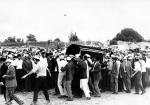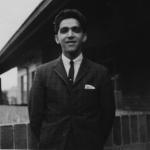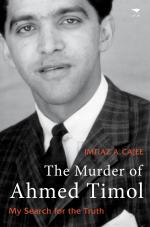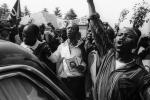
Apartheid, Amnesty, Amnesia
I’m currently researching the re-opening of unresolved cases of human rights violations that occurred during apartheid and that remained unresolved when the South African Truth and Reconciliation Commission (TRC) drew to a close in 1998. These cases have been suppressed for political reasons for more than twenty years – those who are responsible for crimes against humanity committed during apartheid fear persecution, and have placed obstacles in the way of those who would see justice done.
Ahmed Timol
My research so far has focused on the case of anti-apartheid activist Ahmed Timol, the first activist to have died in the custody of Security Police at John Vorster Square Police Station (renamed Johannesburg Central Police Station) in 1971. The police claimed that Timol had thrown himself out of the window of an interrogation room on the 10th floor of the notorious building. More than forty years after Timol’s death, the court over-ruled the findings of the 1972 inquest, which determined that the activist had committed suicide, and declared that he had been murdered. The landmark verdict was passed by Judge Billy Mothle in the High Court in Pretoria in October 2017 and opened the way for apartheid-era perpetrators to be placed on trial.

Joao ‘Jan’ Rodrigues, allegedly the last person to have seen Timol before he died, is the only Security Policeman directly involved in the case who is still alive. The 81-year-old has contested the charges laid against him, and just weeks before he was due to appear in court in October 2020, claimed that he was granted amnesty after the TRC hearings ended. He alleges that an ‘Amnesty Task Team’ was set up to deal with people like him, who did not testify at the TRC. The details of this Task Team were never made public.
While Rodrigues claims that he cannot remember who granted him amnesty (a President, he is unsure which one), or exactly when it was bestowed upon him, in his own mind, and in the slippery thinking of his legal team, the fact that he is only now being called to account, bolsters his claim to having been acquitted. The Timol family’s forty-seven-year struggle for justice, recounted in detail by Timol’s nephew, Imtiaz Cajee, in his book The Murder of Ahmed Timol (2020) has been twisted around by Rodrigues’ legal team to argue that the lengthy delay between the date of the murder and the re-opening of the case is, in fact, unfair to Rodrigues.

'Late, but not too late'?
Just like so many other white South Africans who have never had to take responsibility for their wrongdoings under apartheid, or even to acknowledge that apartheid itself was a crime, Rodrigues seems to imagine himself mysteriously absolved. Even though a blanket amnesty was never granted in South Africa, only a fraction of the Security Policemen known to have been involved in torture and murder during apartheid have stood trial. For the most part, those who once worked as part of the regime of state-sponsored terror simply continued in their jobs and were absorbed into the post-apartheid military and police service. Many others found work in the country’s massive private security industry, or hired out their expertise to foreign governments.
Many of those responsible for atrocities committed under apartheid are still alive and well, however, just as was the case with Nazi perpetrators after the end of the Second World War, by now a large number of people who held power in the apartheid-era Security establishment and who could have shed light on human rights violations, have died without ever testifying in court, taking their knowledge with them to their graves and never facing the consequences of their actions. In 2013, when a campaign was launched in Germany to pursue surviving Nazis who had evaded capture, it operated under the slogan ‘Late, but Not Too Late’. ‘But by this time,’ as historian Mary Fulbrook writes in Reckonings: Legacies of the Nazi Persecution and the Quest for Justice (2018), ‘it was precisely that: way past the point for any serious legal reckoning with Nazi perpetrators or for caring adequately for the needs of those who had suffered at their hands’ (page 337).
In South Africa, the re-opening of the Ahmed Timol inquest has been followed by the re-opening of inquests into the deaths of anti-apartheid activists Neil Aggett and Ernest Dipale. The Security Police claimed that both Aggett and Dipale hanged themselves in their cells at John Vorster Square in 1982.

The proceedings of the re-opened inquests are being live-streamed by the Foundation for Human Rights in South Africa. One of the most disturbing aspects of these hearings is how apartheid-era perpetrators continue to maintain that they were not witness to torture, and never participated in inhumane acts themselves.
At the same time, the Supreme Court of Appeal is deliberating whether or not Rodrigues will be tried for his role in Timol’s murder. Impunity and amnesia stand in the path of justice, but the re-opening of the Timol case and the possibility that perpetrators will be tried for the crime of apartheid, is a sign of hope that delusions of amnesty will be put to rest at last.
By: Kylie Thomas (Marie Skłodowska-Curie Research Fellow, NIOD)